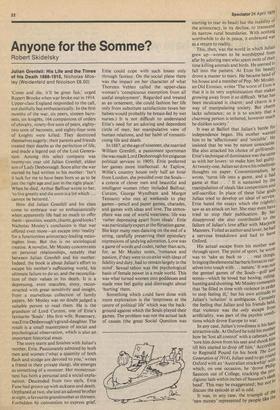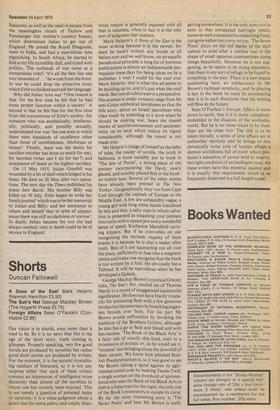Anyone for the Somme?
Robert Skidelsky
Julian Grenfell: His Life and the Times of his Death 1888-1915, Nicholas Mosley (Weidenfeld and Nicolson £6.50) 'Come and die, it'll be great fun,' urged Rupert Brooke when war broke out in 1914. Upper-class England responded to the call, not dutifully but enthusiastically. In the first months of the war, six peers, sixteen baronets, six knights, 164 companions of orders of chivalry, ninety-five sons of peers, eightytwo sons of baronets, and eighty-four sons of knights were killed. They destroyed themselves eagerly ; their parents and friends treated their deaths as the perfection of life, and made a legend out of the Lost Generation. Among this select company was twenty-six year old Julian Grenfell, eldest son of Lady Desborough. Soon after the war started he had written to his mother: 'Isn't it luck for me to have been born so as to be just the right age and just in the right place.' When he died, Arthur Balfour wrote to her, 'to live greatly and die soon is a lot which,,. cannot be bettered.'
How did Julian Grenfell and his class come to embrace war so enthusiastically when apparently life had so much to offer them—position, wealth, charm, good looks? Nicholas Mosley's conclusion is that war offered even more—an escape into 'reality' for a functionless aristocracy leading meaningless lives. But this is no sociological treatise. A novelist, Mr Mosley concentrates on personal relationships, notably that between Julian Grenfell and his mother. Indeed, the book is about Julian's effort to escape his mother's suffocating world, his ultimate failure to do so, and the reconciliation of their values in his death. It is a depressing, even macabre, story, reconstructed with great sensitivity and insight, from a marvellous collection of family papers. Mr Mosley was no doubt judged a suitable person to read them. He is the grandson of Lord Curzon, one of Ettie's favourite 'Souls'. His first wife, Rosemary, was Ettie Desborough's grand-daughter. The result is a small masterpiece of social and psychological observation, which is also an important historical essay.
The story starts and finishes with Julian's mother, Ettie. Passionately admired by both men and women (*what a quantity of both flash and stodge are devoted to you,' writes a friend in their private slang), she emerges as something of a monster. Her monstrousness has both a personal and a social explanation. Descended from two earls, Ettie Fane had grown up with sickness and death. Orphaned at two, she lost an adored brother at eight, a favourite grandmother at thirteen. Forbidden by convention to' express grief, Ettie could cope with such losses only through fantasy. On the social plane there was the impact on her character of what Thorsten Veblen called the upper-class woman's 'conspicuous exemption from all useful employment'. Regarded and treated as an ornament, she could fashion her life only from substitute satisfactions (even her babies would probably be breast-fed by wet nurses.) It is not difficult to understand Ettie's need for an adoring and dependent circle of men, her manipulative view of human relations, and her habit of romanticising life and death.
In 1887, at the age of nineteen, she married William Grenfell, a passionate sportsman ( he was made Lord Desborough for exiguous political services in 1905). Ettie preferred her games more intellectual. At Taplow, Willie's country house only half an hour from London, she presided over the Souls— a coterie of clever men and beautiful and intelligent women (they included Balfour, Curzon, George Wyndham and Margot Tennant) who met at weekends to play games—pencil and paper games, charades, and games with ideas and love. The atmosphere was one of world weariness: life was 'rather depressing apart from ideals'. Ettie was particularly expert at the flirtation game. She kept many men dancing on the end of a string, carefully preserving their epistolary expressions of undying adoration. Love was a game of words and codes, rather than acts, for, as Mr Mosley notes, 'romance and passion, if they were to co-exist with ideas of fidelity and duty, had to remain largely in the mind'. Sexual taboo was the psychological basis of female power in a male world. This was what turned women into goddesses and made men feel guilty and distraught about 'hurting' them.
Something Which could have done with more exploration is the 'emptiness at the centre of political life' which was the background against which the Souls played their games. The problem was not the actual lack of causes (the great Social Question was starting to rear its head) but the inability of the aristocracy, in its decline, to transcend its narrow rural boundaries. With nothing worthwhile to do in peace, it embraced war as a return to reality.
This, then, was the world in which Julian grew up—women to be worshipped from afar by adoring men who spent most of their time killing animals and birds. He seemed to fall into the pattern. At Eton his beauty drove a master to tears. He became head Of his house and a member of Pop. Mr Mosley, an Old Etonian, writes 'The worst of Eton is that it is its very sophistication that makes growing away from it so difficult. What has been inculcated is charm; and charm is a way of manipulating society. But charm lacks substance; so it is to society that a charming person is tethered, however much he dislikes society.' It was at Balliol that Julian's battle for independence began. His mother wanted him to be 'affectionate' and 'sociable'. He insisted that he was by nature unsociable. She also attacked his choice of girlfriends. Ettie's technique of dominance was the same as with her lovers: to make him feel guiltY. At twenty-one, Julian set down his rebellious thoughts on paper. Conventionalism, he wrote, 'turns life into a game, and a bad game at that . . .' It is sustained by the manipulation of ideals like competition and self-sacrifice. In place of these false gods Julian tried to develop an ideal of service. Ettie hated the essays which she (rightly) saw as an attack on her. She may even have tried to stop their publication. By he'. disapproval she also contributed to the failure of Julian's love affair with Marjorie Manners. Foiled as author and lover, he had a nervous breakdown and had to leave Oxford.
His actual escape from his mother was through sport. The point of sport, he wrote was to 'take us back to . . . real things, bringing the elemental barbaric forces in ourselves into touch with ... nature.' It was tint the genteel games of the Souls—golf and tennis—which he loved but boxing, riding, hunting and shooting. Mr Mosley comments that 'he filled in time with violence in order to stop feeling ill,' but his own attitude to Julian's 'solution' is ambiguous. CertainlY the feeling that Julian and his friends he1d. that violence was the only escape from artificiality, was part of the psychic conditions which drove Europe to war. In any case, Julian's rowdiness is his least attractive side. At Oxford he told his mothecir how he 'lost all control' with a cabman, all 'tore him down from his seat and shook hirli till bits started to drop off him.' According to Reginald Pound (in his book The 10; Generation of 1914), Julian used to go roul Oxford with an 'Australian stockwhip' which, on one occasion, he 'drove Phi "P Sassoon out of College, cracking the Prl; digious lash within inches of Sassoon's sleet() head'. This may be exaggerated; but not discuss the episode at all is odd. It was, in any case, the triumph of the_ 'new money' represented by people like he
Sassoons, as well as the need to escape from the meaningless rituals of Taplow and Panshanger (his mother's country house), which determined Julian to get out of England. He joined the Royal Dragoons, went to India, and had a marvellous time pigsticking. In South Africa, he started to find army life incredibly dull, and toyed with politics. The outbreak of war came as a tremendous relief: 'it's all the best fun one ever dreamed of ...' he wrote from the front. In war he could drop the attractive irony which Ettie so disliked and talk her language.
Why did Julian 'love war' ? One reason is that 'for the first time he felt that he had some proper function within a society'. A second is that he felt free for the first time from the conventions of Ettie's society: for someone who was aesthetically, intellectually, politically, and possibly sexually, undeveloped war was 'the one area in which there were standards of excellence other than those of snobbishness, bitchiness or money'. Finally, there was the desire for sacrifice (mother has done so much for me), for heroism (what can I do for her?) and acceptance of death as the highest sacrifice.
On 13 May 1915, Julian Grenfell was wounded by a bit of shell which lodged in his brain. He died on 26 May after two operations. The next day the Times published his poem Into Battle. His brother Billy was killed on 30 July. Ettie began to write her family journal 'which was to be her memorial to Julian and Billy; and her assurance to others and herself that in spite of appearances there was still no darkness or sorrow'. In death, Julian became the son she had always wanted; only in death could he be of service to England.



































 Previous page
Previous page